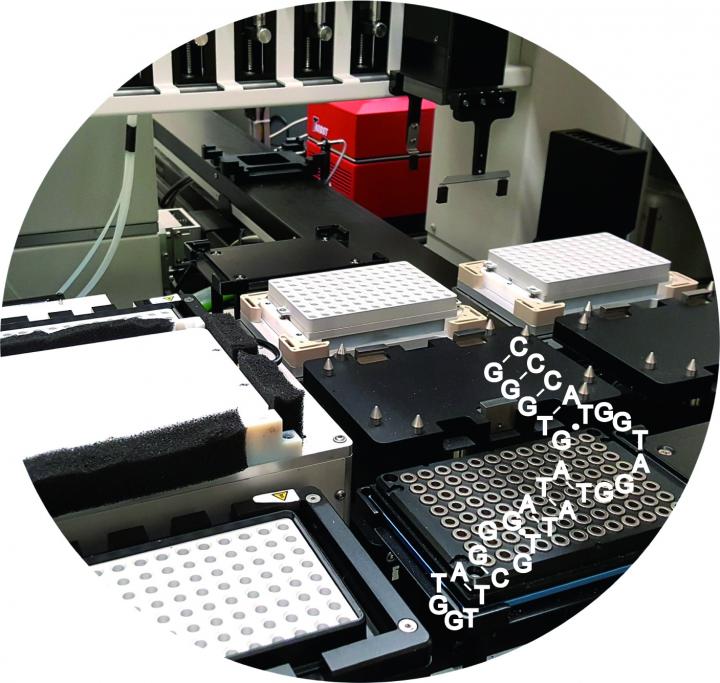Active ingredient inhibits infection with so-called pseudoviruses in the test tube, as shown by study at the University of Bonn

Credit: © Stefan Breuers/LIMES
Scientists at the University of Bonn and the caesar research center have isolated a molecule that might open new avenues in the fight against SARS coronavirus 2. The active ingredient binds to the spike protein that the virus uses to dock to the cells it infects. This prevents them from entering the respective cell, at least in the case of model viruses. It appears to do this by using a different mechanism than previously known inhibitors. The researchers therefore suspect that it may also help against viral mutations. The study will be published in the journal Angewandte Chemie but is already available online.
The novel active ingredient is a so-called aptamer. These are short chains of DNA, the chemical compound that also makes up chromosomes. DNA chains like to attach themselves to other molecules; one might call them sticky. In chromosomes, DNA is therefore present as two parallel strands whose sticky sides face each other and that coil around each other like two twisted threads.
Aptamers, on the other hand, are single-stranded. This allows them to form bonds with molecules to which conventional DNA would not normally bind and to influence their function. This makes them interesting for research into active ingredients, especially since it is now very easy to produce huge libraries of different aptamers. Some of these libraries contain millions of times more potential active ingredients than there are people living on Earth. “We used such a library to isolate aptamers that can attach to the spike protein of SARS coronavirus 2,” explains Prof. Dr. Günter Mayer of the LIMES Institute (the acronym stands for “Life and Medical Sciences”) at the University of Bonn.
Spike is essential for the infection
The spike protein is essential for the virus: It uses it to dock onto the cells it attacks. In the process, the protein binds to a molecule on the surface of its victims called ACE2, which effectively locks into the spike protein, much like a ski boot in a ski binding. The virus then fuses with the cell and reprograms it to produce numerous new viruses. “The vast majority of antibodies we know today prevent docking,” Mayer explains. “They attach to the part of the spike protein responsible for recognizing ACE2, which is the receptor binding domain, or RBD.”
The now isolated aptamer with the abbreviation SP6 also binds to the spike protein, but at a different site. “SP6 does not prevent viruses from docking to target cells,” explains Prof. Dr. Michael Famulok of the LIMES Institute, who also works at the caesar research center in Bonn. “Nevertheless, it reduces the level of cell infection by the virus; we do not yet know which mechanism is responsible for this.” The researchers did not use real coronaviruses in their experiments, but so-called pseudoviruses. These carry the spike protein on their surface; however, they cannot cause disease. “We now need to see if our results are confirmed in real viruses,” Famulok therefore emphasizes.
New Achilles heel of coronavirus?
If so, in the medium term the work could for instance result in a kind of nasal spray that protects against coronavirus infection for a few hours. The necessary studies will certainly take months to complete. Irrespective of this, however, the results may help to better understand the mechanisms involved in infection. This is all the more important because the existing active ingredients mainly target the receptor domain. In the so-called “British mutation”, this domain is altered so that it binds more strongly to ACE2. “The more such mutations accumulate, the greater the risk that the available drugs and vaccines will no longer work,” stresses Günter Mayer. “Our study may draw attention to an alternative Achilles’ heel of the virus.”
The results are also evidence of successful cooperation: Mayer and his postdoctoral researcher Dr. Anna Maria Weber were primarily responsible for characterizing the aptamer. Prof. Famulok’s group at the caesar research center was responsible for conducting the pseudovirus experiments, which were led by his colleague Dr. Anton Schmitz. Famulok and Mayer are members of the Transdisciplinary Research Areas “Life & Health” and “Building Blocks of Matter and Fundamental Interactions”. Mayer also heads the Center of Aptamer Research and Development (CARD) at the University of Bonn.
###
Funding:
The study was funded by the German Federal Ministry of Education and Research (BMBF) and the German Research Foundation (DFG).
Publication: Schmitz, A., Weber, A., Bayin, M., Breuers, S., Fieberg, V., Famulok, M., and Mayer, G. (2021), A SARS?CoV?2 spike binding DNA aptamer that inhibits pseudovirus infection by an RBD independent mechanism. Angew. Chem. Int. Ed. Accepted Author Manuscript.
https:/
Contact:
Prof. Dr. Günter Mayer
LIMES-Institut der Universität Bonn
Tel. +49-228-732935
E-mail: [email protected]
Prof. Dr. Michael Famulok
LIMES-Institut der Universität Bonn
Forschungszentrum caesar
Tel. +49-228-735661
E-mail: [email protected]
Media Contact
Prof. Dr. Günter Mayer
[email protected]
Original Source
https:/
Related Journal Article
http://dx.




